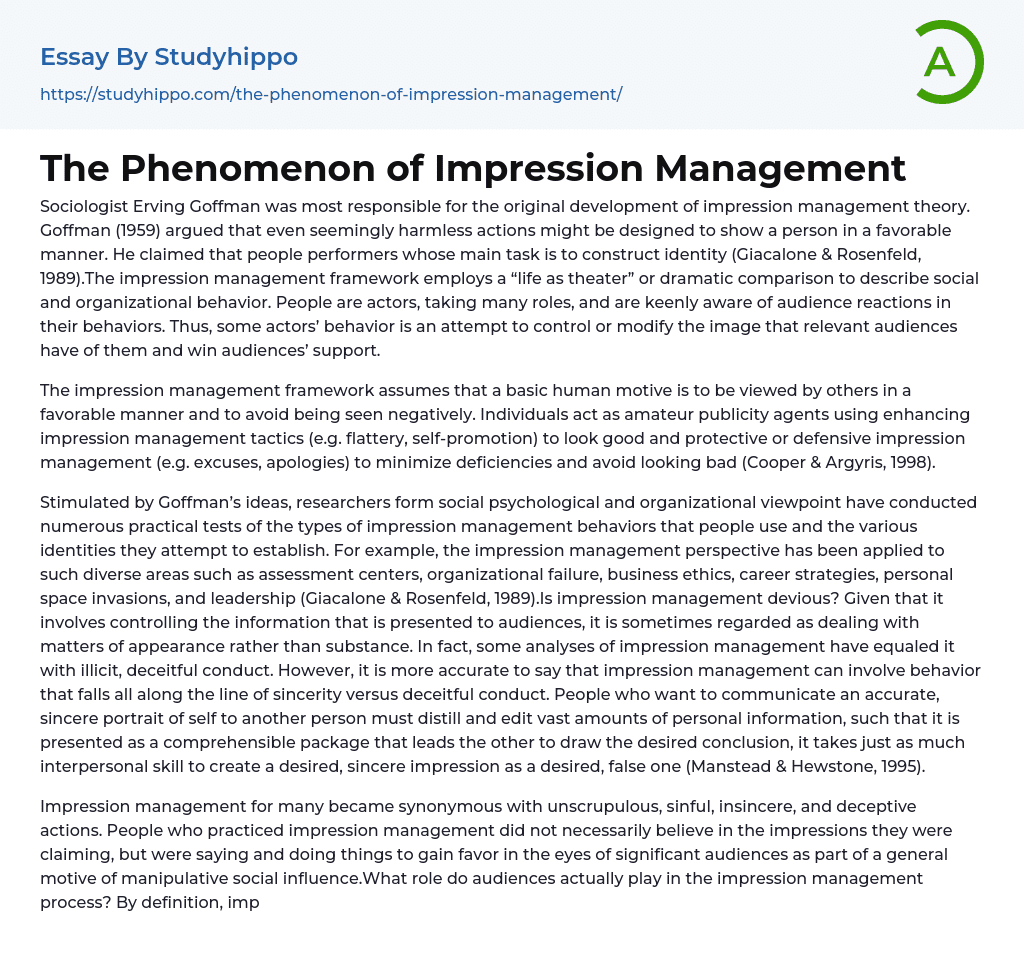The original development of impression management theory can be attributed to sociologist Erving Goffman. In 1959, Goffman proposed that even seemingly innocuous actions can be intentional in depicting a favorable image of oneself. He believed that people are essentially performers whose primary objective is constructing identity (Giacalone & Rosenfeld, 1989). Impression management theory relies on a comparison to theater, where life is akin to a stage and individuals play various roles, constantly aware of the reactions of their audience. Consequently, some individuals may modify their behavior to control the image of themselves that their relevant audience perceives, with the aim of winning their support.
The impression management framework implies that one of people's fundamental desires is to be perceived positively by others and to avoid negative perceptions. People therefore behave as amateur publicists, employing various enhancing tactics like flat
...tery and self-promotion to enhance their image, as well as protective or defensive tactics such as apologies and excuses, to mitigate weaknesses and evade negative judgments (Cooper & Argyris, 1998).
Researchers from both social psychology and organizational viewpoints have conducted practical tests on impression management behaviors and identities based on Goffman's ideas. These tests have covered a range of topics, including assessment centers, business ethics, personal space invasions, and leadership. Some people view impression management as devious, as it involves selectively controlling information presented to audiences. However, it is more accurate to say that impression management can fall anywhere between sincere and deceitful conduct. To accurately communicate a sincere portrayal of oneself to others, individuals must sift through personal information and edit it in a way that leads to the desired conclusion. Creating a desired, sincere impression require
just as much interpersonal skill as creating a false one. (Giacalone & Rosenfeld, 1989; Manstead & Hewstone, 1995)
Many people associate impression management with dishonest and insincere behavior aimed at manipulating others. Those who engage in this practice don't necessarily believe the impressions they project, but rather use them to gain favor from important audiences. The audience's reaction plays a significant role in regulating the actor's behavior in impression management, as it involves trying to create a specific impression on them. Most research highlights the immediate audience's impact on behavior.
According to recent studies, an actor's behavior can be influenced more strongly by audiences who are powerful, attractive, expert, or higher in status. In addition, researchers have started investigating other types of audiences that affect impression management like imaginary audiences -- significant individuals who are not actually present such as parents or friends -- and self-as-audience for one's own behavior (Manstead & Hewstone, 1995).
According to Goffman, people engage in impression management in various ways, some consciously and others unconsciously. For instance, when a guy courts a woman, he strives to make a good first impression, hoping to be viewed positively. On the other hand, women remove hair from different parts of their bodies to present a hairless appearance that is regarded as socially acceptable. Nonetheless, impression management can be beneficial for social interactions since it encourages appropriate behavior and prevents societal breakdown resulting from unrestrained actions.
Goffman (1959) acknowledged the negative aspects of impression management, when people manipulate their audience in deceitful and harmful ways (Ferrante ; Ferrante-Wallace, 2005). This creates a dilemma as disclosing inappropriate or unpleasant information can offend or alienate the audience, but concealing
it can seem dishonest. Cultural influences may impact impression management as the implied meanings may not be explicitly communicated.
Due to social norms and the need for impression management, negative views about minorities are often implied rather than explicitly stated. For example, an indirect statement like "the politicians were concerned about rising crime in the inner city" presupposes the existence of crime in that area, even though it is not explicitly mentioned (Holliday, Kullman, ; Hyde, 2004). Another cultural issue that affects impression management is race, particularly concerning the impact of racism and discrimination on how black people present themselves to others. It is important to recognize the significant influence of discrimination and racism on the way black people interact with the outside world.
According to Robinson (1995), skin color serves as a marker of divergence and prejudice is present throughout every level of society, manifesting through beliefs of genetic inadequacy and cultural pathology. It is crucial to not only comprehend the responses and suspicion of white individuals towards black individuals, but to also recognize nonverbal conduct among black individuals. The resentment and distrust experienced by black individuals towards white individuals may be seen as a suitable and accommodating reaction.
- Perseverance essays
- Expressive essays
- Character Traits essays
- Apology essays
- Compassion essays
- Leadership and Management essays
- Change Management essays
- Project Management essays
- Knowledge Management essays
- Operations Management essays
- Quality Management essays
- Risk Management essays
- Scientific Management essays
- supply chain management essays
- Performance Management essays
- Time Management essays
- Brand Management essays
- Total Quality Management essays
- Risk essays
- Manager essays
- Leadership essays
- Business Ethics essays
- Board Of Directors essays
- Product Management essays
- Comparative Analysis essays
- Decision Making essays
- Dispute Resolution essays
- Stress Management essays
- Business Management essays
- Brand Equity essays
- Branding essays
- Nike, Inc. essays
- Market share essays
- Razor essays
- Being A Leader essays
- Servant Leadership essays
- Leadership Experience essays
- Leadership Qualities essays
- Incentive essays
- Feminism essays
- Animal Rights essays
- Animal Testing essays
- Bullying essays
- Abortion essays
- Abuse essays
- Immigration essays
- Poverty essays
- Human Rights essays
- Inequality essays
- Violence essays




